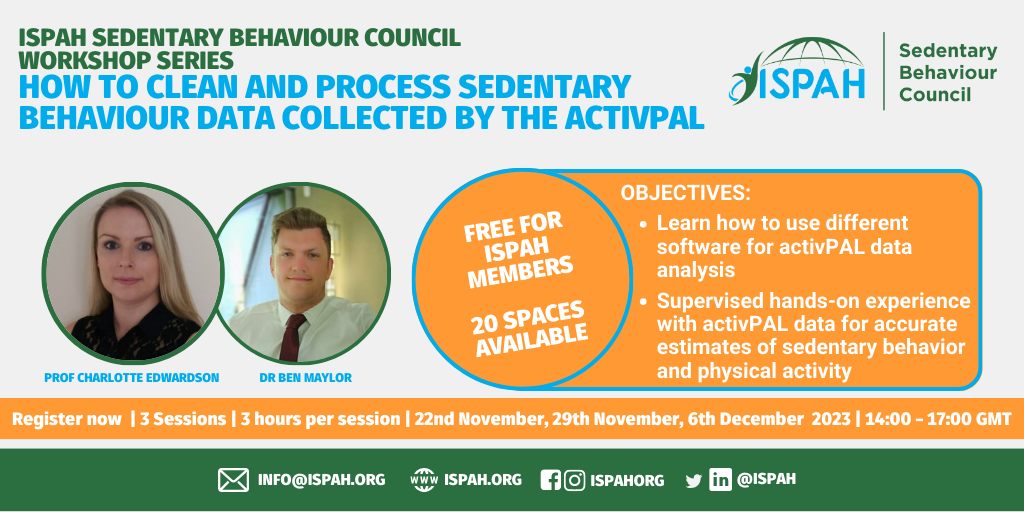The Sedentary Behaviour Council (SBC) welcomes everyone to attend the workshop series focusing on cleaning and processing sedentary behaviour data collected by the activPAL. The sessions will provide information on different software available to use with activPAL data and how to use them, as well as a supervised hands-on experience on cleaning, processing, visualising and summarizing activPAL data to produce accurate estimates of sedentary behaviour and physical activity.

Register here:
FREE for ISPAH members | 20 spaces available
Speakers:
1. Dr. Charlotte Edwardson ProcessingPAL Creator University of Leicester
2. Dr. Ben Maylor Postdoctoral Researcher University of Leicester
Chair:
Paul Mackie Co-Chair Sedentary Behaviour Council International Society for Physical Activity and Health
Program
Session 1: Setting the scene: Cleaning and processing decisions, importance of visualising data and visualising data activity. Brief introduction on the different programmes that are available for bulk processing activPAL data, what they offer, advantages and disadvantages, validation.
- Exploration into PAL Technologies software suite
- PAL Batch and PAL Analysis overview, functions, visualisations, data formats available, exports, outputs
- Demonstration on how to use
- Hands on activity/homework activity to explore visuals and exporting outputs (using sample data and/or their own data)
Session 2: Exploration into the Processing PAL software.
- Processing PAL overview
- Sleep/non-wear algorithm description (development and validation)
- Processing PAL overview, functions, visualisations, outputs
- Demonstration on how to use basic functions
- How well has the algorithm performed on sample data
- Correct or not to correct data using self-reported diary information
- Hands on activity/homework activity to process data through Processing PAL and produce outputs
Session 3: Comparison of basic summary data from PAL Technologies software suite and Processing PAL (produced following session 1 and 2), additional functions available within Processing PAL (how to perform data corrections using self-reported diary information, extracting times of interest (e.g., work times, school times), changing algorithm and valid day parameters), and challenging datasets (e.g., shift workers, disrupted sleep).
- Hands on activity to use additional Processing PAL functions.
Dates: 22nd Nov 2023 | 29th Nov 2023 | 6th Dec 2023 Time: 14:00 – 17:00 GMT
Duration: 3 hours/session
The workshop will be recorded and made accessible to all ISPAH members (via the ISPAH members section) who are unable to attend. Check out the previous SBC webinars here: https://ispah.net/members-area/webinars/





